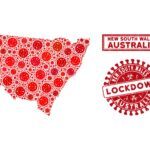Should Businesses Be Forced to Police Covid Orders?

With Greater Sydney set to open up in the coming weeks, the NSW Government proposes to introduce a ‘vaccine passport’ which will enable entry into a range of venues including restaurants, bars and sporting events for the vaccinated, and leave the unvaccinated at the door.
And Premier Berejiklian has made clear that businesses who fail to enforce the orders will face hefty fines, and even closure.
But this presents a serious predicament for business owners, leaving them exposed to backlash from the general public as well as vulnerable to potential anti-discrimination complaints.
All customer-facing businesses are grappling with at least two significant issues right now; firstly, whether to enforce their staff to be vaccinated, and secondly, how to deal with customers who are not vaccinated.
The vaccination quagmire for small business
The Federal Government has already shifted the burden of mandating vaccines in the workplace to employers, with the Prime Minister stating “[b]usinesses have a legal obligation to keep their workplaces safe and to eliminate or minimise so far as ‘reasonably practicable’ the risk of exposure to COVID-19.”
And the Fair Work Ombudsman recently set guidelines stating that businesses can set their own employee vaccination policies under its guidelines which offer a tiered system for categorising workers. Additionally, the Ombudsman advised that such direction must meet standards for lawful and reasonable action.
Of the handful of unfair dismissal cases that have made it to the Fair Work Commission over vaccine refusal, none have been decided in favour of the employee. However, there are currently several cases before the Supreme Court of New South Wales, the outcomes of which could impact the power of employers to force vaccinations on workers.
‘No jab, no job’
Discriminating against people and stopping their ability to work is unheard of in Australia. Having a solid work ethic has always, in fact, been applauded. Scott Morrison himself once said that ‘the best form of welfare is a ‘job’.
Unions have already stated that while they’re encouraging employees to get vaccinated, they will support those who choose not to do so. Unions have also warned businesses that they could very well face staff shortages if people decide to quit, rather than be vaccinated.
At a Federal level, the Government is still insisting that vaccines are voluntary.
‘No jab, no play’
NSW’s planned vaccine passports/certificates which will run through the QR check-in app, are a direct contraction to this Federal policy.
But the NSW Government is pushing ahead anyway, and while we are yet to see the final version of what these vaccine certificates, or passports will look like, it would appear, at this point, that the government will hand over the responsibility of policing them to business too.
Most small businesses just want to open and to start trading again after months of lockdown and zero revenue, and many don’t want that level of responsibility.
The onus on struggling business
Most of the businesses in NSW are small businesses, many are family businesses — they don’t have big in-house legal or HR expertise.
Most won’t even have the money to pay an additional staff member just to police the entry. Nor do they want the responsibility of dealing with potentially irate customers.
Most small businesses are the backbone of our suburbs and small communities and don’t want to polarise their neighbourhoods by having to choose who they can service and who they can’t. Hundreds have already taken to ‘pro choice’ social media forums advertising jobs for people who don’t want to be vaccinated and welcoming customers, regardless of their vaccination status.
While vaccine passports might sound like a good idea, in reality they will be very difficult for businesses to police and enforce, which could simply erode their validity over time.
The shift towards authoritarianism
While small businesses are calling on the NSW Government to provide them with legislative protection, but this could prove problematic too, because we have a system of democracy in this country which has long valued social cohesion, human rights and civil liberties – values that Australians, by and large, would like to see protected and maintained. Vaccination passports and employee mandates put a great big slice in the heart of democracy.
That said, there are precedents for vaccine passports around the world. In the UK they’re for large venue admission only.
But the French Government has taken them to a whole new level, introducing harsh legislation which prohibits anyone from entering a range of venues including cafes, cinemas, restaurants and even shops, without being vaccinated, with penalties including steep fines and jail time for patrons who break the law, and business owners who don’t check the validity of patrons covid-status.
France is a democracy, and when the ‘big brother’ legislation was going through Parliament people rioted in the streets. Now it has been passed, the cafes and restaurants are deserted — people instead picnic on the grounds outside.
Copycat policies
Sadly, in facing the Covid-19 pandemic, Australia seems to have lost its sense of innovation — there’s nothing that our governments aren’t considering — or implementing — that hasn’t already been implemented in some form or another overseas.
Yet, because we have had much smaller health crisis compared to other countries such as the UK and the USA, it could be argued that we have had a bit more time to look at overseas models that are working and those that are not and consider things differently, instead of just pushing ahead with policies similar to those that are now failing in other countries as a result of public dissent or are being challenged in courts.
Many of the decisions that have been made during the pandemic have been designed to ‘stop the spread’ but it has not escaped people’s attention that many have also seriously eroded freedoms and rights and privacy.
The problem is that many of these decisions have been rushed through under Emergency Powers without the full robust law-making process, which would otherwise encourage more debate and consultation and consider the serious long-term consequences.







